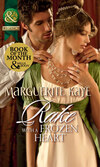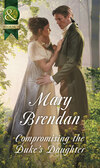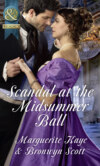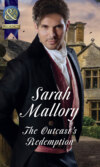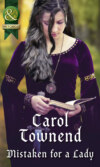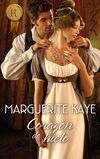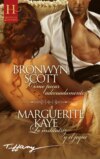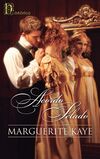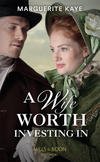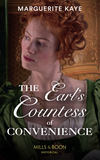Kitabı oku: «Rake with a Frozen Heart», sayfa 2
She frowned. ‘I suppose the point is that they must be good at taking people in, else how could they succeed in being a rake?’ she said to herself. So was it a good thing that he hadn’t taken her in? She couldn’t make up her mind. The one thing she knew for certain was that he was most eager to be rid of her. Henrietta tried not to be mortified by that.
Perhaps he just wanted to know how she had come to be on his estate in the first place? She’d like to know that herself, she thought, touching a cautious finger to the aching lump on her head. Last night. Last night. What did she remember of last night?
That dratted pug dog of Lady Ipswich’s had run off. She’d entirely missed her dinner while looking for it, no wonder she was so hungry now. Henrietta frowned, screwing her eyes tightly shut, ignoring the dull ache inside her skull as she mentally retraced her steps. Out through the side door. The kitchen garden. Round to the side of the house. Then …
The housebreaker! ‘Oh, my goodness, the housebreaker!’ Her mind cleared, like the ripples of a pool stilling to reveal a sharp reflection. ‘Good grief! Lady Ipswich will be wondering what on earth has happened to me.’
Gingerly, Henrietta inched out of the luxurious bed and peered at the clock on the mantel. The numbers were fuzzy. It was just after eight. She opened the curtains and blinked painfully out at the sun. Morning. She had been gone all night. Her rescuer had clearly been out and about very early. In fact, now she had a chance to reflect upon it, he had had the look of a man who had not yet been to bed.
Raking, no doubt! But those shadows under his eyes spoke of a tiredness more profound than mere physical exhaustion. Rafe St Alban looked like a man who could not sleep. No wonder he was irritable, she thought, immediately feeling more charitable. Having to deal with a comatose stranger under such circumstances would have put anyone out of humour, especially if the aforementioned stranger looked like a—like a—what on earth did she look like?
There was a looking glass on top of the ornately inlaid chest of drawers in front of the window. Henrietta peered curiously into it. A streak of mud had caked on to her cheek, she was paler than normal and had a lump the size of an egg on her head, but apart from that she looked pretty much the same as always. Determinedly un-rosebuddish mouth. Eyebrows that simply refused to show even the tiniest inclination to arch. Too-curly brown hair in wild disorder. Brown eyes. And, currently in the hands of the aforementioned Mrs Peters, a brown dress.
She sighed heavily. It summed things up, really. Her whole life was various shades of brown. It was to her shame and discredit that no amount of telling herself, as Papa constantly reminded her, that there were many people in the world considerably worse off than her, made her feel any better about it. It was not that she was malcontent precisely, but she could not help thinking sometimes that there must be more to life. Though more of what, she had no idea.
‘I suppose being thumped on the head, then being left to die of exposure, to say nothing of being rescued by a devastatingly handsome earl, counts as a burst of genuine excitement,’ she told her reflection. ‘Even if he is a very reluctant knight errant with a very volatile temperament and an extremely dubious reputation.’
The clock on the mantel chimed the quarter-hour, making her jump. She could not possibly add keeping the earl from his breakfast to her other sins. Hastily, she slopped water from the jug on the nightstand into the prettily flowered china bowl and set about removing the worst of the mud from her face.
Almost precisely on time, Henrietta tripped into the breakfast parlour with her hair brushed and pinned, her body swathed in her host’s elegant dressing gown of dark green brocade trimmed with gold frogging. Even with the cuffs turned back and the gown belted tightly at her waist, it enveloped her form completely, trailing behind her like a royal robe. The idea that the material that lay next to her skin had also lain next to his naked body was unsettling. She tried not to dwell on the thought, but it could not be said she was wholly successful.
She was nervous. Seeing the breakfast table set for just two made her even more nervous. She had never before had breakfast alone with a man, save for dear Papa, which didn’t count. She had certainly never before had breakfast with a man while wearing his dressing gown. Feeling incredibly gauche and at the same time excruciatingly conscious of her body, clothed only in her underwear, handicapped by the voluminous folds of the dressing gown, Henrietta tripped into the room.
He didn’t seem to notice her at first. He was staring into space, the most melancholy expression on his face. Darkly brooding. Formidable. Starkly handsome. Her pulses fluttered. He had shaved and changed. He was wearing a clean shirt and freshly tied cravat, a tightly fitting morning coat of dark blue, and buff-coloured pantaloons with polished boots. The whole ensemble made him look considerably more earl-like and consequently considerably more intimidating. Also, even more devastatingly attractive. Henrietta plastered a faltering smile to her face and dropped into a very far from elegant and certainly not, she was sure, deep enough curtsy. ‘I must apologise, my lord, for being so remiss, I have not yet thanked you properly for rescuing me. I am very much obliged to you.’
Her voice dragged Rafe’s thoughts back from the past, where he had once again been lingering. Be dammed to the precious title and the need for an heir! Who really cared, save his grandmother, if it was inherited by some obscure third cousin twice removed? If she only knew what it had cost him already, she would soon stop harping on about it. He gazed down at Henrietta, still smiling up at him uncertainly. Holding out his hand, he helped her back to her feet. ‘I trust you feel a little better, Miss Markham. You certainly look very fetching in my robe. It is most becoming.’
‘I’m perfectly all right, all things considered,’ Henrietta said, grateful for his support as she got up from her curtsy, which had made her head swim. ‘And as for the robe, it is very gallant of you to lie, but I know I must look a fright.’
‘Frightfully nice, I’d say. And you must believe me, for I am something of an expert in these matters.’
His haunted look had disappeared. He was smiling now. Not a real smile, not one that reached his eyes, but his mouth turned up at the corners. ‘I think I’ve finally remembered what happened,’ Henrietta said.
‘Yes?’ Rafe shook his head, dispelling the ghosts that seemed to have gathered there. ‘It can wait. You look as if you need food.’
‘I am hungry—a dog made me miss my dinner.’
For the second time that morning, Rafe laughed aloud. This time it sounded less rusty. ‘Well, I am happy to inform you that there are no dogs here to make you miss your breakfast,’ he said. The dressing gown gave Henrietta Markham a winsome quality. It gaped at the neck, showing far too much creamy bosom, which she really ought to have had the decency to confine in stays. She looked as if she had just tumbled from his bed. Which in a way, she had. He realised he’d been staring and looked away, slightly disconcerted by the unexpected stirrings of arousal. Desire was usually something he could conjure up or dispense with at will.
Helping her into a seat, he sat down opposite, keeping his eyes resolutely on the food in front of him. He would feed her, find out where she had sprung from and return her there forthwith. Then he would sleep. And after that he must return to town. The meeting with his grandmother could not be postponed indefinitely. An immense malaise, grey and heavy as a November sky, loomed over him at the thought.
So he would not think of it. He need not, not just yet, while he had the convenient distraction of the really quite endearing Henrietta Markham sitting opposite him, in his dressing gown, with her tale to tell. Rafe poured her some coffee and placed a generous helping of ham on to her plate along with a baked egg and some bread and butter, helping himself to a mound of beef and a tankard of ale. ‘Eat, before you faint with hunger.’
‘This looks delicious,’ she said, gazing at her loaded plate with relish.
‘It is just breakfast.’
‘Well, I’ve never had such a nice breakfast,’ Henrietta said chirpily, at the same time, thinking be quiet! She was not usually a female who wittered, yet she sounded uncommonly like one this morning. Nerves. Yet she was not usually one to allow nerves to affect her behaviour. Off balance. He disconcerted her, that’s what it was. The situation. The dressing gown. The man. Definitely the man. This man, who was telling her, with a quizzical look that meant she’d either been muttering to herself or allowing her thoughts to be read quite clearly on her face, that it would be a nice cold breakfast unless she made a start on it.
She picked up her fork. Was he just teasing, or did he think she was an idiot? She sounded like an idiot. He had the ability to make her feel like one. Taking a bite of deliciously soft egg, she studied him covertly from under her lashes. The dark shadows were clearer now in the bright morning light that streamed through the windows. He had a strained look about his mouth. She ate some more egg and cut into a slice of York ham. He was edgy, too. Even when he smiled, it was as if he were simply going through the motions.
Clearly not happy, then. Why not, she wondered, when he had so much more than most? She longed to ask, but another glance at that countenance, and the question stuck in her throat. More than anything, Henrietta decided, what Rafe St Alban was, was opaque. She had no idea what he was thinking. It made her want, all the more, to know, yet still—quite unusually, for Henrietta had been encouraged from a very early age to speak her mind—she hesitated.
A tiny frisson, this time excitement mingled with fear, caused goose bumps to rise on the back of her neck. He was not just intimidating. He was intimidatingly attractive. What was it about him that made her feel like this? Fascinated and frightened and—as if she were a rabbit faced with a particularly tasty treat, though she knew full well it was bait. She was beginning to see Rafe St Alban’s reputation might well be deserved, after all. If he set his mind to something, she would be difficult to resist.
She shivered again and told herself not to be so foolish. He would not set his mind on her! And even if he did, knowing the type of man he was, being fully aware of his lack of morals, she would have no difficulty at all in resisting him. Not that he had made any such attempt, nor was likely to.
More to the point, why was she wasting her time thinking about such things? She had much more important matters to attend to now that she remembered the shocking events of last night. Even before that, she must attend to her stomach, else she would be fainting away, and Henrietta, who prided herself on her pragmatism, would not allow herself such an indulgence. With resolution, she turned her attention more fully to her breakfast.
Chapter Two

When they had finished eating, Rafe stood up. ‘Bring your coffee. We’ll sit by the fire, it will be more comfortable there. Then you can tell me your tale.’
Awkwardly arranging the multitudinous folds of silk around her in the wing-backed chair, Henrietta did as instructed. Across from her, Rafe St Alban disposed his long limbs gracefully, crossing one booted foot over the other. She could see the muscles of his legs move underneath the tight-fitting material of his knitted pantaloons. Such unforgiving cloth would not show to advantage on a stouter man. Or a thinner one. Or one less well built.
‘I’m a governess,’ she announced, turning her mind to the thing most likely to distract her from unaccustomed thoughts of muscled thighs, ‘to the children of Lady Ipswich, whose grounds march with yours.’
‘They do, but we are not on calling terms.’
‘Why not?’
‘It is of no relevance.’
Anyone else would have been daunted by his tone, but Henrietta’s curiosity was aroused, which made her quite oblivious. ‘But you are neighbours, surely you must—is it because she is a widow? Did you perhaps call when her husband was alive?’
‘Lord Ipswich was more of an age with my father,’ Rafe said curtly.
‘He must have been quite a bit older than his wife, then. I didn’t realise. I suppose I just assumed….’
‘As you are wont to do,’ Rafe said sardonically.
She looked at him expectantly. Her wide-eyed gaze was disconcerting. Her mouth was quite determined. Rafe sighed heavily, unused to dealing with such persistent questioning. ‘His lordship passed away under what one might call somewhat dubious circumstances, and I decided not to continue the acquaintance with his widow.’
‘Really?’
‘Really,’ Rafe said, wishing he had said nothing at all. The poor innocent obviously had no idea of her employer’s colourful past and he had no intention of disclosing it to her. ‘How came you to be in Helen Ipswich’s employ?’ he asked, in an attempt to divert her.
‘There was a notice in The Lady. I happened to be looking for a position and Mama said that it all looked quite respectable, so I applied.’
‘Your previous position was terminated?’
‘Oh, no, this is my first experience as a governess, though not, I hope, my last,’ Henrietta said with one of her confiding smiles. ‘I am going to be a teacher, you see, and I wished to gain some practical experience before the school opened.’ Her smile faded. ‘Though from what Mama says in her latest letter, that will be quite some time away.’
‘Your mother is opening a school?’
‘Mama and Papa together—’ Henrietta frowned ‘—at least, that is the plan, but I have to confess their plans have a habit of going awry. The school is to be in Ireland, a charitable project for the poor. Papa is a great philanthropist, you see.’
Henrietta waited expectantly, but Rafe St Alban did not seem to have a burning need to comment on Papa’s calling. ‘The problem is that while his intentions are always of the best, I’m afraid he is not very practical. He has more of a care for the soul than the body and cannot be brought to understand that, without sustenance and warmth, the poor have more pressing needs than their spiritual health, nor any interest in raising their minds to higher things. Like statues of St Francis. Or making a tapestry celebrating the life of St Anthony—he is the patron saint of the poor, you know. I told Papa that they would be better occupied making blankets,’ Henrietta said darkly, too taken up with her remembered resentment to realise that she was once again rambling, ‘but he did not take my suggestion kindly. Mama, of course, agreed with him. Mama believes that distracting the poor from their situation is the key, but honestly, how can one be distracted when one is starving, or worried that one is expecting another child when one cannot feed the other five already at home? The last thing one would want to do is stitch a figure of St Anthony voyaging to Portugal!’
‘I don’t expect many of the poor even know where Portugal is,’ Rafe said pointedly. Papa and Mama Markham sounded like the kind of do-gooders he despised.
‘Precisely,’ Henrietta said vehemently, ‘and even if they did—are you laughing at me?’
‘Would you mind if I were?’
‘No. Only I didn’t think what I was saying was particularly droll.’
‘It was the way you were saying it. You are very earnest.’
‘I have to be, else I will never be heard.’
‘So, while Mama and Papa pray for souls, you make soup—is that right?’
‘There is nothing wrong with being practical.’
‘No, there is not. If only there was more soup and less sermons in the world….’
‘My parents mean well.’
‘I’m sure they do, but my point is that meaning well is not the same as doing well. I come across many such people and—’
‘I was not aware you had a reputation for philanthropy.’
‘No, as you pointed out,’ Rafe said coldly, ‘my reputation primarily concerns my raking. Now you will tell me that one precludes the other.’
‘Well, doesn’t it?’ Henrietta demanded. Seeing his face tighten, she hesitated. ‘What I mean is, being a rake presupposes one is immoral and—’ She broke off as Rafe’s expression froze. ‘You know, I think perhaps I’ve strayed from the point a little. Are you saying that you are involved in charitable work?’
She was clearly sceptical. He told himself it didn’t matter a damn what she thought. ‘I am saying the world is not as black and white as either you or your parents seem to think.’ His involvement with his own little project at St Nicholas’s was extremely important to him, but he did not consider it to be charitable. With some difficulty, Rafe reined in his temper. What was it about this beguiling female that touched so many raw nerves? ‘You were telling me about the school your parents want to set up.’
‘Yes.’ Henrietta eyed him uncertainly. ‘Have I said something to offend you?’
‘The school, Miss Markham.’
‘Well, if—when—it opens I intend to be able to contribute in a practical sense by teaching lessons.’ Practical lessons, she added to herself, remembering Mama’s curriculum with a shudder.
‘Lessons which you are trying out on Helen Ipswich’s brats?’
‘They are not brats,’ Henrietta said indignantly. ‘They are just high-spirited boys. I’m sure you were the same at their age, wanting to be out riding rather than attending to your studies, but—’
‘At their age, my father was actively encouraging me to go out riding and ignore my lessons,’ Rafe said drily. ‘My tendency to bury my head in a book sorely disconcerted him.’
‘Goodness, were you a scholar?’
‘Another thing that you consider incompatible with being a rake, Miss Markham?’
He was looking amused again. She couldn’t keep pace with his mood swings, but she couldn’t help responding to his hint of a smile with one of her own. ‘Well, to cut a long story short, which I’m sure you’ll be most relieved to hear I intend to do, I like being a governess and I like the boys, even if their mama is a little—well—high-handed. Not that I really see that much of her, governesses clearly meriting scant attention. Anyway, I’m sure there are worse employers, and the boys do like me, and if—when—the school is opened, I am sure the experience will stand me in good stead. It is due to do so in three months or so, by which time my current charges are destined for boarding school, anyway, so hopefully they won’t miss me too much. Not anything like as much as I shall miss them.’
‘There, we must agree. Small boys, in my experience, are remarkably fickle in their loyalties.’
‘Do you think so?’ Henrietta asked brightly. ‘I think that’s a good thing, for I would not wish them to become too attached to me. What experience have you of such things? Have you brothers?’
‘No.’
His face was closed again, his expression shuttered. ‘I take it, then, that life as Helen Ipswich’s governess has fulfilled your expectations?’
‘Yes, it has served its purpose admirably.’
‘How fortunate for you. Now, if you don’t mind, we will return to the more pressing subject of how you came to be in my ditch, then you may return to these duties you enjoy so much. No doubt your employer will be wondering what has become of you.’
‘That is true. And the boys, too.’ Though the notion of returning to Lady Ipswich’s home was less appealing than it should be. Another of a rake’s skills, no doubt, to beguile you and make you want to spend time in his company. Henrietta sat up straight and tugged at the dressing-gown belt. ‘Well, then, to return to the subject, as you wish. Last night. Well, what happened last night was that I was knocked on the head by a housebreaker.’
‘A housebreaker!’
Gratified by her host’s reaction, which was for once just exactly what she had anticipated, Henrietta nodded vigorously. ‘Yes, indeed. At least,’ she added, incurably truthful, ‘I am almost certain that is what he was, though I didn’t actually see him steal anything. I was looking for Lady Ipswich’s horrible dog, you see.’
‘The dog who deprived you of your dinner?’
‘The very same. I heard a noise coming from the shrubbery, so I went to investigate it, thinking, you know, it might be Princess—that’s the pug’s name—and then I heard glass breaking. I held up the lantern and saw him as clear as day for just a split second, then he leapt at me and hit me on the head. The next thing I remember is waking up here.’
Rafe shook his head slowly. ‘But that’s nonsensical. Even if it was a housebreaker, why on earth would he go to the trouble of taking you with him? It takes time and effort to heft a body on to a horse.’
Henrietta coloured. ‘I am aware that I am not exactly a featherweight.’
‘That is not at all what I meant. It is women who consider stick-thinness the essence of beauty. Men actually prefer quite the opposite. I find your figure most pleasing on the eye.’ Rafe was not in the habit of encouraging young ladies with compliments, for they were likely to be misconstrued, but Henrietta Markham was so different from any young lady he had ever met that he spoke without considering the effect his words would have. ‘It was no hardship to get you on to my horse. I meant merely it would be awkward if the man were slight, or elderly.’
Or one less muscled, Henrietta thought, her gaze lingering on her host’s powerful physique. It hadn’t occurred to her until now to wonder how, exactly, he had retrieved her from the ditch. Had he pulled her by the wrist or the ankle? Held her chest to chest, or maybe thrown her over his shoulders? And when she was on his horse, was she on her front with her bottom sticking up? With her petticoats on show? Her ankles? Worse? Feigning heat from the fire, she frantically fanned her face.
Rafe followed the train of her thoughts with relative ease, mirrored as they were in her expressive face, recognising the exact moment when she tried to imagine how she had been placed on Thor’s saddle. Unfortunately, it turned his mind also to that moment. He had lain her crossways on her stomach with her bottom pointed provocatively up to the sky. Her dress had ridden up a little, exposing her ankles and calves. At the time, he had not been aware of noticing. Yet now, in his mind’s eye, he found he could dwell appreciatively on the inviting curves of her voluptuous body as if he had drunk in every inch of her.
‘Why,’ he said tersely, reining in his imagination, once again disconcerted by having to do so, ‘having gone to all that effort to abduct you, did your housebreaker then change his mind and abandon you in my grounds?’
‘I don’t know,’ Henrietta replied. ‘It doesn’t make any sense, I can see that. Perhaps he had evil designs upon my person and then changed his mind when he got a better look at me,’ she said with a wry smile.
‘If that was the case, then his taste was quite at fault,’ Rafe said impulsively, bestowing upon her his real smile.
It quite transformed his face. Henrietta blushed rosily, but even as she struggled for a response, the smile was gone, as if a cloud had covered the sun. Utterly confused, she folded her arms defensively. ‘You don’t really believe a word I’ve said, do you?’
The dressing gown gaped. Rafe caught a glimpse of creamy flesh spilling from a plain white cotton undergarment. The rake in him would have allowed his glance to linger. He wanted to look, but it was his wanting that made him look resolutely away. Nothing touches you any more. The memory of his friend Lucas’s words made Rafe smile bitterly to himself. True, thank God, if you didn’t count the all-pervading guilt. He had worked very hard to ensure it was so and that was exactly how he intended it to continue. Wanting was no longer part of his emotional make-up. Wanting Henrietta Markham, he told himself sternly, was completely out of the question.
‘You have to admit that it sounds a tall tale,’ he said to her, his voice made more dismissive by the need to offset his thoughts, ‘but my opinion is of little importance. I would have thought the more pressing issue for you is whether or not Lady Ipswich believes you.’ He got to his feet purposefully. Henrietta Markham had been a very beguiling distraction, but the time had come to put an end to this extraordinary interlude and for them both to return to the real world. ‘I will arrange for you to be taken back in my carriage. Your dress should be dry by now.’ He pulled the bell rope to summon the housekeeper.
Henrietta scrabbled to her feet. He was quite plainly bored by the whole matter. And by her. She should not be surprised. She should certainly not feel hurt. She was, after all, just a lowly governess with a preposterous story; he was an earl with an important life and no doubt a string of beautiful women with whom to carry on his dalliances. Women who didn’t wear brown dresses and who most certainly didn’t lie around waiting to be pulled out of ditches. ‘I must thank you again for rescuing me,’ she said in what she hoped was a curt voice, though she suspected it sounded rather huffy. ‘Please forgive me for taking up quite so much of your time.’
‘It was a pleasure, Miss Markham, but a word of warning before you go.’ Rafe tilted her chin up with the tip of his finger. Her eyes were liquid bronze. Really, quite her most beautiful feature. He met her gaze coolly, though he didn’t feel quite as cool as he should. He wasn’t used to having his equilibrium disturbed. ‘Don’t expect to be lauded as a heroine,’ he said softly. ‘Helen Ipswich is neither a very credulous nor a particularly kind person.’ He took her hand, just brushing the back of it with his lips. ‘Good luck, Henrietta Markham, and goodbye. If you return to your room, I’ll send Mrs Peters up with your dress. She will also see you out.’
He could not resist pressing his lips to her hand. She tasted delightful. The scent of her and the feel of her skin on his mouth shot a dart of pleasure to his groin. He dropped her hand abruptly, turned on his heels and left without a backward glance.
Just the faintest touch of his mouth on her skin, but she could feel it there still. Henrietta lifted her hand to her cheek and held it there until the tingling faded. It took a long time before it finally did.
Molly Peters, Rafe’s long-suffering housekeeper, was an apple-shaped woman with rosy cheeks. Her husband, Albert, who alone was permitted to call her his little pippin, was head groom. Molly had started service in the previous earl’s day as a scullery maid, ascending by way of back parlourmaid, chambermaid and front parlourmaid, before eventually serving, briefly and unhappily, as lady’s maid to the last countess. Upon her ladyship’s untimely death, Master Rafe had appointed Molly to the heady heights of housekeeper, with her own set of keys and her own parlour.
Running the household was a task Molly Peters undertook with pride and carried out extremely competently. Indeed, she would have executed it with gusto had she been given the opportunity, but even when the last countess had been alive, Woodfield Manor had seldom been used as a residence. As a result, Mrs Peters had little to do and was frankly a little bored. Henrietta’s unorthodox arrival provided some welcome excitement and consequently induced an unaccustomed garrulousness in the usually reserved housekeeper.
‘I’ve known Master Rafe all his life, since he was a babe,’ she said in answer to Henrietta’s question. ‘A bonny babe he was, too, and so clever.’
‘He has certainly retained his looks,’ Henrietta ventured, struggling into her newly brushed, but none the less indisputably brown dress.
Mrs Peters pursed her lips. ‘Certainly, he has no shortage of admirers,’ she said primly. ‘A man like Lord Pentland, with those looks and the Pentland title behind him, to say nothing of the fact that he’s as rich as Croesus, will always attract the ladies, but the master is—well, miss, the truth is …’ She looked over her shoulder, as if Rafe would suddenly appear in the bedchamber. ‘Truth is, he’s the love-’em-and-leave-’em type, as my Albert puts it, though I say there’s little loving and a darn sight more leaving. I don’t know why I’m telling you this except you seem such a nice young lady and it wouldn’t do to—But then, he’s not a libertine, if you know what I mean.’
Henrietta tried to look knowledgeable, though in truth she wasn’t exactly sure she understood the distinction between rake and libertine. Certainly Mama had never made one. She was attempting to formulate a question that would persuade Mrs Peters to enlighten her without revealing her own ignorance when the housekeeper heaved a huge sigh and clucked her teeth. ‘He wasn’t always like that, mind. I blame that wife of his.’
‘He’s married!’ Henrietta’s jaw dropped with shock. ‘I didn’t know.’ But why should she? Contrary to what his lordship thought, Henrietta was not a great one for gossip. Generally speaking, she closed her ears to it, which is why Rafe St Alban’s accusations had hurt. In fact, she had only become aware of his reputation recently, a chance remark of her employer’s having alerted her. But if he was married, it made his behaviour so much worse. Somewhat irrationally, Henrietta felt a little betrayed, as if he had lied to her, even though it was actually none of her business. ‘I hadn’t heard mention of a wife,’ she said.
‘That’s because she’s dead,’ Mrs Peters replied quietly. ‘Five years ago now.’
‘So he’s a widower!’ He looked even less like one of those. ‘What happened? How did she die? When did they marry? Was he—did they—was it a love match? Was he devastated?’ The questions tripped one after another off her tongue. Only the astonished look on Mrs Peters’s face made her stop. ‘I am just curious,’ Henrietta said lamely.
